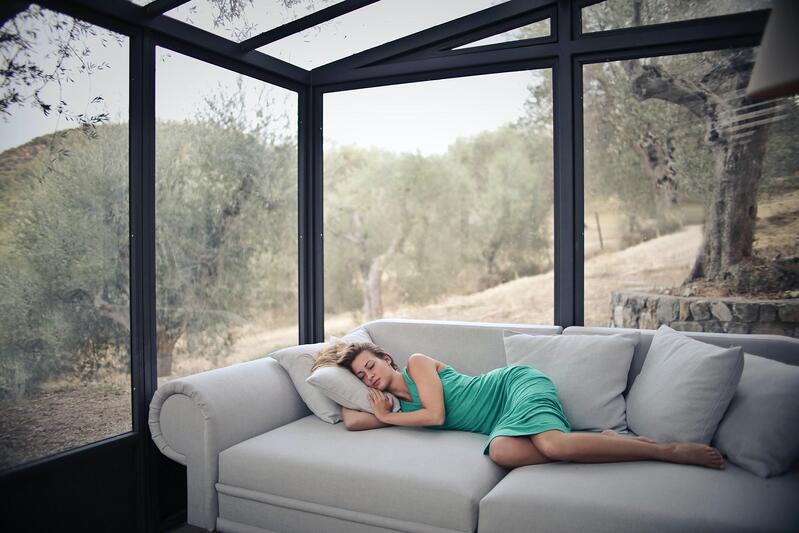The Best Temperature for Sleep
Summer is now in full swing, and that means long, hot sunny days and warmer nights. And while during the day it may be easy to escape the heat by visiting the beach, rafting on rivers, or even running through the sprinklers with your children in the backyard, it’s often much more difficult to avoid the heat at night when you’re trying to sleep.
It’s a strange phenomenon that excessive heat can make you feel tired and fatigued, while at the same time making sleep at night harder to achieve. So what exactly is the relationship between body temperature and sleep, and how can you find the best temperature to help you fall asleep? Here we aim to answer those questions and more.
The Relationship Between Body Temperature and Sleep
Most experts agree that core body temperature has a lot to do with how well you sleep. Your circadian rhythm (internal body clock) regulates many functions of the body including heart rate, blood pressure, hormone release, and body temperature; all which act together to help you stay awake during the day, and sleep at night.
When you begin to fall asleep your body temperature naturally begins to decrease by 1 to 2 degrees of normal wakefulness temperature (98.6 degrees Fahrenheit). Researchers believe that our body temperature dips so that it can conserve energy for other functions that would normally be spent on maintaining regular body temperature.
However, in either hot or cold sleep environments our bodies struggle to reach the optimal body temperature for sleep which leads to restlessness, difficulty falling asleep or maintaining sleep, and fragmented sleep.
External temperatures can also make you feel tired and sluggish when exposed to heat, but surprisingly make sleep onset difficult. The reason you feel lazy in the heat is because your body fights against the outside temperature to prevent itself from overheating. It does this by expanding blood vessels to carry more blood to the skin to help you cool off. As a result of expanded blood vessels however, your blood pressure drops, leading to less oxygen levels in the blood being carried to various systems, which in turn causes fatigue.
What exactly can you do to help maximize sleep in hot temperatures? Two of the best practices you can do are to practice sleep hygiene and maximize your sleep environment.
The ideal sleep environment is cool, dark, clutter free, quiet, and associated with sleep and sex only. Sleep hygiene is a series of practices and routines that help your body and mind prepare for sleep each night allowing you to get to sleep easier and stay asleep longer. Common sleep hygiene practices include choosing healthy foods for sleep, getting regular exercise during the day, avoiding substances such as caffeine and alcohol before bed, doing relaxing activities before bedtime, and exposing yourself to daylight at key times during the day.
For those that still have trouble sleeping in the heat, here are a few tips to help maximize your sleep potential:
Tips to Find the Best Temperature for Sleep
 Lower thermostat to between 60-70 degrees Fahrenheit. Individual preferences will vary, so find the temperature best suited for you. Cooler bedrooms help facilitate your body temperature decline.
Lower thermostat to between 60-70 degrees Fahrenheit. Individual preferences will vary, so find the temperature best suited for you. Cooler bedrooms help facilitate your body temperature decline.- Close blinds/curtains during the day to block out heat from the sun.
- Keep windows closed if the outside temperature is warmer than the inside temperature.
- Open windows after sun goes down or outside temperature becomes cooler than indoor temperature.
- Keep room cool with a ceiling fan or place a portable fan near open window.
- Keep bedroom door open, and open other windows in the house to allow air to circulate freely to cool the house.
- Cool off before bed. Try bringing your core body temperature down by taking a cool shower.
- Heat rises, so if you live in a multi-story home, consider sleeping in a lower floor room.
- Consider purchasing a bed-fan to keep your bed nice and cool.
- Memory foam pillows may be extremely comfortable but they also get very hot. Consider having a backup pillow for hot nights.
- Don’t vigorously exercise before bed. Exercise raises body temperature, and may take longer to cool down. Late night exercise is especially unhealthy for those suffering from insomnia.
- Wear a cool face cloth to bed, keep a water spray bottle for misting, or keep a glass of cold water next to the bed.
For more sleep tips check out some of these articles:
Alaska Summer Sleep Tips: How to Sleep Under the Midnight Sun
- 9 Tips for Creating an Ideal Sleep Environment
- What is Sleep Hygiene? The Best Practices to Help You Sleep Every Night
- Foods for Sleep: A List of The Best and Worst Foods for Getting Sleep
If you find yourself still having sleep troubles after trying these tips, it could be a sign of a sleep disorder. If you would like to talk with a sleep specialist about your sleep issues, contact The Alaska Sleep Clinic for a free 10-minute phone consultation and let us help you decide if a sleep study may be right for you.




